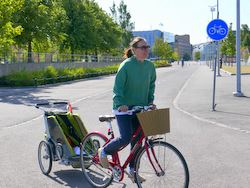 Research by the University of Exeter suggests that some fleeting natural phenomena can affect our perceptions of landscape beauty, and more importantly, stimulate awe.
Research by the University of Exeter suggests that some fleeting natural phenomena can affect our perceptions of landscape beauty, and more importantly, stimulate awe.
This is significant because research elsewhere has shown how awe is associated with reduced stress, improvements in wellbeing, improved memory and more innovative thinking. Work at the University of Toronto has even found an association between awe and reduced markers of inflammation in the body. The University of California showed in 2020 how cultivating awe can boost positive emotions.
Over 2500 UK-based participants were invited to take part in an online survey, in which they assessed two contrasting landscapes, one urban and one rural. Both types of landscape were designed to be broadly favourable, with features such as water which research shows as being preferred in a landscape scene. This was to try to avoid bias against an image of an unattractive built environment. Fleeting natural phenomena, including a sunset, sunrise and a rainbow, were then superimposed on the scenes for the participants to assess against eight criteria, including beauty and awe.
With regard to awe, the rural scene was considered significantly more awe-inspiring than the urban scene, but sunset, sunrise and a rainbow enhanced ratings of awe significantly. When asked, there was even a greater willingness to pay to visit such landscapes at the right time of day to witness these phenomena.
 The researchers say “By highlighting opportunities to experience events such as sunrise or sunset, those in both urban and natural settings could experience a small yet significant increase in this hard-to-elicit emotion. Accompanying rises in awe’s associated benefits, such as increased positive affect and higher levels of altruism (Piff et al., 2015; Sturm et al., 2020), may then follow suit. These outcomes might be particularly beneficial for ‘green prescriptions’ that seek to improve participant wellbeing (Robinson & Breed, 2019).” Further, with implications for the planning of our city scapes, “Moreover, by preserving open skies with eastern or western aspects, planning policies might seek to maximize people’s chances of viewing fleeting phenomena.”
The researchers say “By highlighting opportunities to experience events such as sunrise or sunset, those in both urban and natural settings could experience a small yet significant increase in this hard-to-elicit emotion. Accompanying rises in awe’s associated benefits, such as increased positive affect and higher levels of altruism (Piff et al., 2015; Sturm et al., 2020), may then follow suit. These outcomes might be particularly beneficial for ‘green prescriptions’ that seek to improve participant wellbeing (Robinson & Breed, 2019).” Further, with implications for the planning of our city scapes, “Moreover, by preserving open skies with eastern or western aspects, planning policies might seek to maximize people’s chances of viewing fleeting phenomena.”
So although you might feel some of this research just frames in measurable and scientific terms what we intuitively suspect to be true, it is a reminder not to hurry past the window in a rush when there is a wonderful sunrise just outside waiting to be viewed. The sight of it could be beneficial for your health.
(Beyond blue-sky thinking: Diurnal patterns and ephemeral meteorological phenomena impact appraisals of beauty, awe, and value in urban and natural landscapes. Journal of Environmental Psychology, March 2023.)

 A survey by the University of Southampton of 352 traditional acupuncturists, suggests their work is supporting key UK public health targets for promoting healthy lifestyles. Four key health behaviours – diet, physical activity, smoking and alcohol consumption – are now established as primary causes of ill health in the UK. Large scale surveys have shown patients report making health behaviour changes as a result of complementary medical encounters. Usage of complementary medicine is associated with a belief that health is a result of personal behaviour that may include lifestyle.
A survey by the University of Southampton of 352 traditional acupuncturists, suggests their work is supporting key UK public health targets for promoting healthy lifestyles. Four key health behaviours – diet, physical activity, smoking and alcohol consumption – are now established as primary causes of ill health in the UK. Large scale surveys have shown patients report making health behaviour changes as a result of complementary medical encounters. Usage of complementary medicine is associated with a belief that health is a result of personal behaviour that may include lifestyle. American researchers have found that morning and evening exercise offer different benefits to men and women. For women, morning exercise reduces both abdominal fat and blood pressure, whilst evening exercise improves muscle performance. In men, evening exercise is preferable if the aim is to reduce blood pressure.
American researchers have found that morning and evening exercise offer different benefits to men and women. For women, morning exercise reduces both abdominal fat and blood pressure, whilst evening exercise improves muscle performance. In men, evening exercise is preferable if the aim is to reduce blood pressure. 
